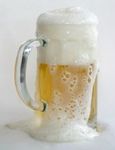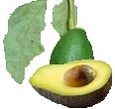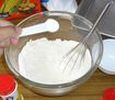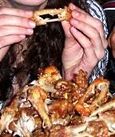Dangerous and /or
Poisonous Foods for Dogs
- Part II -
Poisonous foods for dogs aren't labeled with any warning signs. Most toxic foods for dogs are, in fact, common household foods which are absolutely harmless to humans.
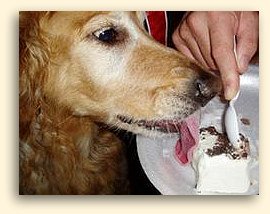 |
Dog Food Scoop's articles will educate you and, hopefully, lessen tragic incidents of innocent dog poisoning.
Please note, all the information provided on our list of poisonous foods for dogs, is intended for educational purposes only, and there can be no substitute for professional advice and treatment.
If you suspect your pooch has ingested any poisonous foods for dogs
Please contact your Veterinarian or Animal Poison Hotline
IMMEDIATELY!
Time is critical when dealing with dog poisoning.
(Always keep a phone number handy for emergencies)
We encourage you to share this information with all family members, and fellow dog owners and lovers. Let's all do our bit to keep our beloved pooches safe!
POISONOUS FOODS FOR DOGSTABLE OF CONTENTS |
| Alcohol | Avocados | Baking Soda (Leavening Agents) | Bones - Cooked vs. Raw | Caffeine | Chocolate | Corn on the Cob |
| Fatty Foods | Garlic | Grapes | Hops | Moldy or Spoiled Foods | Mushrooms | Nuts - Macadamias, Almonds, Walnuts |
| Nutmeg | Onions | Pits and Seeds of Fruits | Potato Peelings and Green Potatoes | Raisins | Raw Eggs | Raw Fish |
| Rawhide Dog Bones | Rhubarb | Salt | Sweeteners - Artificial | Tobacco | Tomatoes | Yeast Dough (Raw) |
IMPORTANT: If your dog has ingested a toxic food for dogs, the treatment may or may NOT involve inducing vomiting. In some cases, inducing vomiting can cause more harm than good. Please do not take matters into your own hands.
  Poisonous Foods for Dogs (Alphabetical Order) | |
| ALCOHOL | |
All alcoholic beverages - wine, beer, liquor, etc. - and any foods containing alcohol are poisonous foods for dogs. SIGNS AND SYMPTOMS Early symptoms of toxicity include diarrhea, vomiting, decreased rate of breathing, decreased heart rate, and lack of coordination. This can progress to loss of consciousness, coma, and even death. HOW MUCH IS TOO MUCH? It is very dose dependent. An ounce of alcohol ingested by a Chihuahua will have a much more harmful effect than it would on a Saint Bernard. WHY IS ALCOHOL A POISONOUS FOOD FOR DOGS? Excessive alcohol, as is the case with humans, can severely damage the dog's liver and brain. The harmful component is ethanol which, when ingested in large amounts can cause chronic alcohol poisoning which may lead to total liver failure and death. | |
| AVOCADOS | |
| The avocado pit (seed) and plant (leaves, stems, and bark), particularly of the Guatemalan variety are poisonous foods for dogs.
SIGNS AND SYMPTOMS The first sign of avocado dog poisoning is typically difficulty breathing, followed by symptoms of abdominal enlargement, and fluid accumulation in the chest, abdomen and heart. However, whether or not the actual fleshy fruit of the avocado and the avocado oils are poisonous to dogs, is debatable. In fact, some dog food brands openly use the meat of the avocado in their dog foods, and advocate its nutritional value, as well as its role in promoting healthy skin and coat. One example is AvoDerm Natural dog food by Breeder's Choice Pet Foods - a highly ranked dog food brand. HOW MUCH IS TOO MUCH? The toxic dose is unknown. Therefore, it may vary widely from dog to dog. WHY ARE COMPONENTS OF AVOCADOS POISONOUS FOODS FOR DOGS? The toxic component of avocados is claimed to be persin which is poisonous not only to dogs, but all animals, including birds. It can cause damage to the heart, lung and other tissues. Another caution is that the high fat content of avocados can trigger stomach upset, vomiting and even pancreatitis. The chemistry of the compound is unknown, and there are currently no conclusive studies as to exactly why avocado is a poisonous food for dogs. | |
| BAKING SODA (Leavening Agents) | |
Baking soda, baking powder, and other leavening agents such as dry yeast, are poisonous foods for dogs if ingested in LARGE quantities.
SIGNS AND SYMPTOMS Symptoms and effects of overdose are muscle spasms and/or congestive heart failure. Fortunately, dogs do not generally find these types of leavening agents very appetizing. Hopefully, you typically shouldn't find your pooch actively seeking them out. HOW MUCH IS TOO MUCH? WHY ARE LEAVENING AGENTS POISONOUS FOODS FOR DOGS? Baking soda is simply sodium bicarbonate. Baking powder is a combination of baking soda, calcium phosphate, and sodium aluminum sulfate. These chemical leavening agents are commonly used in baked foods such as bread, cakes, and cookies, to soften the dough and cause the batter to rise. Typically, these compounds release gases when they react with moisture and heat (as in your dog's stomach). This reaction can lead to electrolyte abnormalities (low potassium, low calcium and/or high sodium), muscle spasms and /or congestive heart failure. | |
| BONES (Cooked vs. Raw) | |
While bones are not poisonous foods for dogs - ALL Bones can potentially be extremely dangerous for your pooch, and lead to serious illness and/or fatalities. Cooked bones are much more dangerous.
The worst culprits are chicken bones and pork bones, as they are particularly brittle and likely to splinter. Raw bones are generally considered a safe dog food, and an important component of the BARF diet for dogs (ie: Bones and Raw Food). However! Even raw bones are not 100% safe. They can also break into chips as your pooch gorges on them. Although these fragments are much softer and more digestible than cooked bones, it's not impossible that a particularly jagged edge may be digested and cause problems. KEEP YOUR POOCHES SAFE. Supervise your dogs at all times even when feeding raw bones! SIGNS AND SYMPTOMS Bone fragments can cause damage to the intestinal tract. Symptoms include, vomiting, whimpering, rectal bleeding and/or liquid discharge from the rectum, diarrhea, straining while trying to defecate, and the abdomen will be extremely sensitive upon touch. Bone fragments may also get caught between the teeth or in the jaw. If you notice any of the above signs, get your dog to a veterinarian immediately. HOW MUCH IS TOO MUCH? One razor sharp chip in the wrong place is all that's needed to kill either a teacup size dog or a Great Dane! WHY ARE BONES A DANGEROUS FOOD FOR DOGS? There are two main reasons why bones are such dangerous foods for dogs. Firstly, bones often break off into small pieces and razor sharp splinters. Chicken bones and pork bones are particularly prone to this. Our pooches are very eager to gulp these down. These splinters can lacerate your pet's throat or pierce the intestinal wall and pass into the abdominal cavity. This, in turn, causes hemorrhaging of the intestinal wall and infection of the lining of the abdominal cavity. This situation is very serious and would likely kill your precious dog. The second main reason why bones are a dangerous food for dogs is that it's possible for portions of the undigested bone to become lodged in the intestines causing an obstruction in the dog's digestive system. This blockage prevents gases and other material from escaping which leads to blood poisoning. Older dogs are more prone to this. Intestinal blockage, if not caught in time, may also be fatal to your dog. | |
| CAFFEINE | |
Caffeinated beverages and foods ingested in high enough doses are poisonous foods for dogs and can be lethal.
SIGNS AND SYMPTOMS Symptoms of caffeine poisoning include, rapid breathing, increased heart rate, excitement, muscle tremors and seizures. Many of the same symptoms as chocolate poisoning in dogs may also be noticed. This can progress to heart attacks, coma and death. Caffeine is present in concentrated form in coffee beans and ground coffee. It is also present in:-
HOW MUCH IS TOO MUCH? As a guideline, the lethal dose is considered to be around 70 mg per 1 lb body weight (150 mg / kg body weight). As an example, instant coffee contains over 60 mg caffeine per teaspoon. So, the lethal dose of caffeine for a 15 lb dog would be 17 teaspoons of instant coffee. Stronger coffees such as Turkish coffee, percolated coffees, and energy drinks would take much less to become toxic. WHY ARE CAFFEINATED BEVERAGES POISONOUS FOODS FOR DOGS? Caffeine's effect on dogs is much like chocolate and dogs. It is a chemical stimulant that dogs are unable to metabolize effectively. As a result, it is very damaging to the dog's central nervous system. | |
| CORN ON THE COB | |
Corn on the cob is a dangerous food for dogs and can potentially be fatal.
SIGNS AND SYMPTOMS Corn cobs can cause intestinal obstruction. Symptoms include: vomiting or dry heaving, straining during defecation, loss of appetite, stomach pain, whimpering, trembling, restlessness, and increased or decreased drinking. Keep an eye on your dog, and contact your vet immediately if you notice any of the above symptoms. HOW MUCH IS TOO MUCH? Large dogs may possibly pass the cobs without incident, whereas small to medium dogs will be more susceptible to problems. WHY IS CORN ON THE COB A DANGEROUS FOOD FOR DOGS? Corn cobs are not very digestible and can become stuck in the dog's intestinal tract. Intestinal blockage can not only cause your pooch great abdominal pain but, if left untreated, can lead to death. It is a very serious condition. Note: Additionally, many dogs are allergic to corn, and suffer intestinal effects. If you're looking for an allergy free dog food, you will definitely want a corn free dog food. | |
| FATTY FOODS | |
Although saturated fats aren't technically poisonous foods for dogs, many dog owners aren't aware that high fat foods and fatty leftovers are actually very dangerous foods for dogs. The ingestion of just one fatty meal could cause acute pancreatitis in dogs. Canine pancreatitis is a painful and potentially life-threatening disease. SIGNS AND SYMPTOMS
Symptoms of pancreatitis in dogs may either be mild and not that obvious, or clearly very painful and severe. Signs include vomiting, diarrhea, no appetite, abdominal pain, dehydration, severe weakness and/or collapse, shock, and fever. Signs of abdominal pain include restlessness, heavy panting, wincing, trembling, arched back, or lying with their front down and their rear end up. HOW MUCH IS TOO MUCH? Chronic pancreatitis in dogs may develop over time with regular and frequent ingestion of high fat foods. Or, it could take just one fatty meal to trigger an acute attack of canine pancreatitis. Generally, middle-aged and older female dogs appear to be more susceptible to canine pancreatitis, as do Miniature Poodles, Cocker Spaniels, and Miniature Schnauzers. WHY ARE FATTY FOODS DANGEROUS FOODS FOR DOGS? The pancreas produces enzymes that help break down food. High fat meals can cause these enzymes to become activated within the gland. This in turn causes the pancreas to digest its own glandular tissue, resulting in inflammation, or pancreatitis. Aside from pancreatitis, high fat leftovers and meals lead to weight gain and dog obesity, which in turn is a precursor for many other diseases and dog illnesses. | |
We'll also be preparing a colorful, one-page List of Dangerous and Poisonous Foods for Dogs - handy for posting in your kitchen, work cafeteria, gym, etc. Please contact us if you'd like to receive a copy by email when it's ready.
(Note: This article is being worked on right now. New information will be added daily. To be automatically notified, please click on the orange RSS button on the left side menu, and subscribe to Dog Food Scoop).
CONTINUE TO Dangerous Foods for Dogs - Part III
CONTINUE TO Chocolate Poisoning in Dogs
You are here: Home > Toxic Foods for Dogs - Introduction > Poisonous Foods for Dogs - Part II

